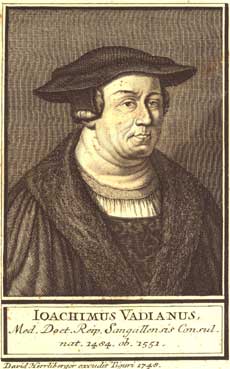Joachim Vadian facts for kids
Quick facts for kids
Vadianus
|
|
|---|---|

Engraving by David Herrliberger from Zürich, 1748, after an older original
|
|
| Born |
Joachim von Watt
29 November 1484 St. Gallen, Abbey Principality of St. Gallen
|
| Died | 6 April 1551 (aged 66) St. Gallen, Abbey Principality of St. Gallen
|
| Other names | Joachim Vadian |
| Occupation | Scholar, historian, editor |
| Known for | Leading humanist scholar of the sixteenth century |
Joachim Vadian (born Joachim von Watt; November 29, 1484 – April 6, 1551) was a very important person in the city of St. Gallen. He was a humanist (someone who loved classical studies), a scholar, a mayor, and a reformer. This means he helped change how people practiced Christianity in his city.
Contents
Biography
Early Life and Studies
Joachim Vadian was born in St. Gallen into a rich family. His family were successful linen merchants. After going to school in St. Gallen, he moved to Vienna in 1501. There, he started studying at the university. He learned from famous teachers like Conrad Celtis.
In Vienna, he changed his name to Joachimus Vadianus. Many scholars at that time changed their names to Latin ones. This showed their respect for ancient Roman and Greek thinkers. In 1506, he left Vienna to avoid the bubonic plague (a serious illness). He went to Villach, where he taught and studied music. He also traveled through northern Italy, visiting cities like Trent, Venice, and Padua. During his travels, he met an Irish scholar named Mauritius Hibernicus.
University Success and Honors
In 1509, Vadian finished his studies and earned a Master of Arts degree. He went back to St. Gallen for a short time. There, he studied old religious texts in the library of the abbey of St. Gall. He then returned to Vienna and became a successful writer.
From 1512, he taught poetry at the University of Vienna. He was already known for writing Latin poems. In 1513, he visited Buda. The next year, Emperor Maximilian I gave him a special honor. He was named poeta laureatus, which means "poet laureate." This was a title given to important poets. In 1516, he became a Dean of the University of Vienna. This was a high position.
Medicine and Return to St. Gallen
In the years that followed, Vadian studied medicine and science. He was especially interested in geography and history. He learned from a scholar named Georg Tannstetter. In 1517, he became a doctor of medicine. After this, he moved back to his hometown, St. Gallen. On his journey, he visited many of his scholar friends in cities like Leipzig and Kraków.
In 1518, Vadian did something amazing. He climbed Mount Pilatus near Lucerne. This was the first time anyone had officially recorded climbing to its top!
Life as a Leader in St. Gallen
Back in St. Gallen, Vadian became the city's doctor (called Stadtarzt in German). On August 18, 1519, he married Martha Grebel. Her brother, Conrad Grebel, later became a leader in the Anabaptist movement.
In 1521, Vadian joined the city council, taking over from his father, Leonhard. Around this time, the Reformation in Switzerland began. This was a big movement that changed how people practiced Christianity. Vadian was a friend of Huldrych Zwingli, a key leader of the Reformation. Even though Vadian had not studied theology (the study of religion), he began to read many religious texts.
From 1522 onwards, Vadian supported the new, reformed ideas. He became the most important supporter of the Reformation in St. Gallen. In 1526, he was elected mayor of the city. As mayor, he led St. Gallen in becoming a Protestant city. He managed to keep St. Gallen Protestant even after the Catholic regions won a war. Vadian wrote several religious books after 1522. These books helped spread the new ideas of the Reformation.
He passed away in St. Gallen. In his will, he gave his large personal library to the city. This collection became the start of the main library of St. Gallen. Today, this library is named Vadiana in his honor.
Selected Works
Vadian wrote many important books during his life. Here are a few examples:
- Vadian: De poetica et carminis ratione liber (Vienna 1518). This was a big book about the history of literature.
- Vadian: Grosse Chronik der Äbte des Klosters St. Gallen (St. Gallen 1529). This book told the history of the abbots (leaders) of the abbey in St. Gallen.
- Vadian: Epitome trium terrae partium, Asiae, Africae et Europae... (Zürich 1534). This was a world atlas. It was one of the first maps to include America.
- Vadian: Aphorismorum de consideratione eucharistiae libri VI (St. Gallen 1535). This was a religious book. It explained the reformed view of the eucharist (a Christian ceremony) as a symbol.
 | Jackie Robinson |
 | Jack Johnson |
 | Althea Gibson |
 | Arthur Ashe |
 | Muhammad Ali |

